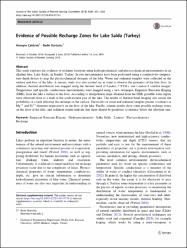Evidence of Possible Recharge Zones for Lake Salda (Turkey)
Abstract
This study explores the evidence of recharge locations using hydrogeochemical and physicochemical measurements in an alkaline lake, Lake Salda, in Burdur, Turkey. In-situ measurements have been performed using a conductivity-temperature-depth device to map the physicochemical dynamic of the lake. Water and sediment samples were collected on the surface and floor of the lake. A seismic study was also carried out in order to observe the geometry of the lake floor. In addition, thermal distribution was mapped using the thermal band of Landsat 7 ETM+ and Landsat 8 satellite images. Temperature and specific conductance measurements were mapped using a new technique, Empirical Bayesian Kriging (EBK), from the lake's surface to the floor. According to interpolation maps obtained from the EBK, possible water inputs were observed close to a fault at the south-eastern part of the lake. The results of thermal band imaging also reveal the probability of a fault effecting the recharge on the surface. The results of water and sediment samples present a richness in Mg2+ and Fe2+ elements respectively on the floor of the lake. Finally, seismic results show some possible recharge zones on the floor of the lake, and sediment results indicate that there should be peridotite occurrence below the alluvium unit.


















